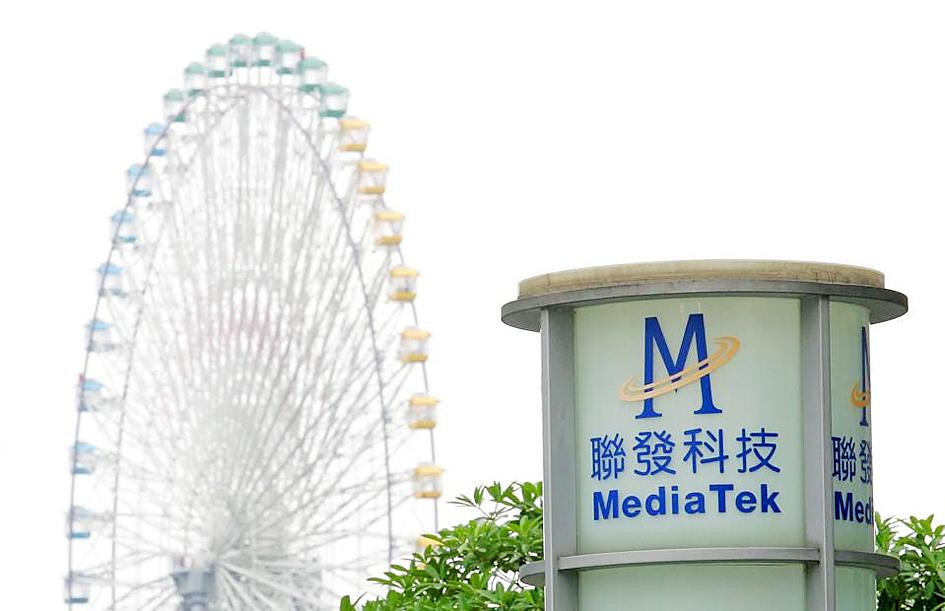Mobile phone chip designer MediaTek Inc (聯發科) posted an average of NT$5.15 million (US$173,249) in annual compensation for non-managerial employees last year, marking the highest among all firms listed on the Taiwan Stock Exchange (TWSE), exchange data showed.
That is a 66 percent increase from the company’s average compensation of NT$3.08 million in 2020, as its earnings per share (EPS) expanded from NT$26.01 in 2020 to NT$70.56 last year.
That is also three times higher than the average compensation of NT$1.7 million in the nation’s semiconductor industry, the data showed.

Photo: Bloomberg
The increases helped MediaTek advance its ranking from third in 2020, replacing Foxconn Technology Co (鴻準精密), a subsidiary of Hon Hai Precision Industry Co (鴻海精密). Foxconn Technology’s ranking dropped to fifth place last year from first with average compensation of NT$4.1 million, the data showed.
MediaTek’s annual compensation also marked an overall all-time high since TWSE companies began disclosing non-managerial salaries in 2018, the data showed.
Seven of the top 10 highest-paying firms are semiconductor companies, compared with six in 2019 and 2020, with vehicle manufacturer Hotai Motor Co (和泰汽車) and some construction companies leaving the list, the data showed.
Taiwan Semiconductor Manufacturing Co (TSMC, 台積電), the world’s largest contract chipmaker, ranked 16th, with average annual compensation of NT$2.42 million last year, partially because of its large employee base of 53,212. Except TSMC, all semiconductor firms in Taiwan have fewer than 10,000 employees, the data showed.
Evergreen Marine Corp (長榮海運) ranked seventh with average annual compensation of NT$3.61 million, and Yang Ming Marine Transport Corp (陽明海運) ranked ninth with compensation averaging NT$2.75 million, the first time shipping companies have been in the top 10 since 2018, the data showed.
Shipping companies last year offered employees greater year-end bonuses given their greater EPS, boosting compensation that includes recurring wages, overtime pay and bonuses, the data showed.
Average compensation for non-managerial employees in the shipping industry grew 21 percent to NT$1.32 million from NT$1.09 million a year earlier, given rises in freight rates, the data showed.
Among all industries, the semiconductor trade posted the greatest average compensation for non-managerial employees at NT$1.7 million, followed by the steel industry at NT$1.48 million, the plastic industry at NT$1.34 million, the financial and insurance industry with NT$1.33 million, and the computer industry with NT$1.32 million, the data showed.

China’s Huawei Technologies Co (華為) plans to start mass-producing its most advanced artificial intelligence (AI) chip in the first quarter of next year, even as it struggles to make enough chips due to US restrictions, two people familiar with the matter said. The telecoms conglomerate has sent samples of the Ascend 910C — its newest chip, meant to rival those made by US chipmaker Nvidia Corp — to some technology firms and started taking orders, the sources told Reuters. The 910C is being made by top Chinese contract chipmaker Semiconductor Manufacturing International Corp (SMIC, 中芯) on its N+2 process, but a lack

TECH BOOST: New TSMC wafer fabs in Arizona are to dramatically improve US advanced chip production, a report by market research firm TrendForce said With Taiwan Semiconductor Manufacturing Co (TSMC, 台積電) pouring large funds into Arizona, the US is expected to see an improvement in its status to become the second-largest maker of advanced semiconductors in 2027, Taipei-based market researcher TrendForce Corp (集邦科技) said in a report last week. TrendForce estimates the US would account for a 21 percent share in the global advanced integrated circuit (IC) production market by 2027, sharply up from the current 9 percent, as TSMC is investing US$65 billion to build three wafer fabs in Arizona, the report said. TrendForce defined the advanced chipmaking processes as the 7-nanometer process or more

NVIDIA PLATFORM: Hon Hai’s Mexican facility is to begin production early next year and a Taiwan site is to enter production next month, Nvidia wrote on its blog Hon Hai Precision Industry Co (鴻海精密), the world’s biggest electronics manufacturer, yesterday said it is expanding production capacity of artificial intelligence (AI) servers based on Nvidia Corp’s Blackwell chips in Taiwan, the US and Mexico to cope with rising demand. Hon Hai’s new AI-enabled factories are to use Nvidia’s Omnivores platform to create 3D digital twins to plan and simulate automated production lines at a factory in Hsinchu, the company said in a statement. Nvidia’s Omnivores platform is for developing industrial AI simulation applications and helps bring facilities online faster. Hon Hai’s Mexican facility is to begin production early next year and the

Who would not want a social media audience that grows without new content? During the three years she paused production of her short do-it-yourself (DIY) farmer’s lifestyle videos, Chinese vlogger Li Ziqi (李子柒), 34, has seen her YouTube subscribers increase to 20.2 million from about 14 million. While YouTube is banned in China, her fan base there — although not the size of YouTube’s MrBeast, who has 330 million subscribers — is close to 100 million across the country’s social media platforms Douyin (抖音), Sina Weibo (新浪微博) and Xiaohongshu (小紅書). When Li finally released new videos last week — ending what has